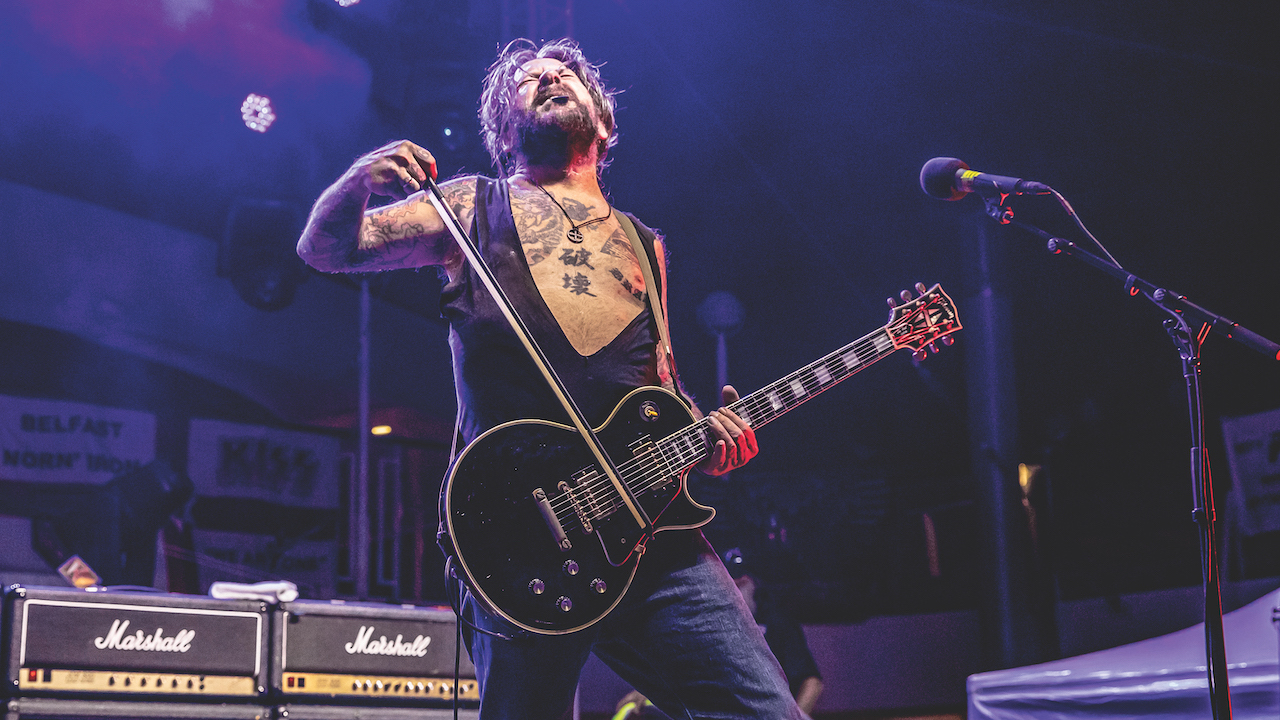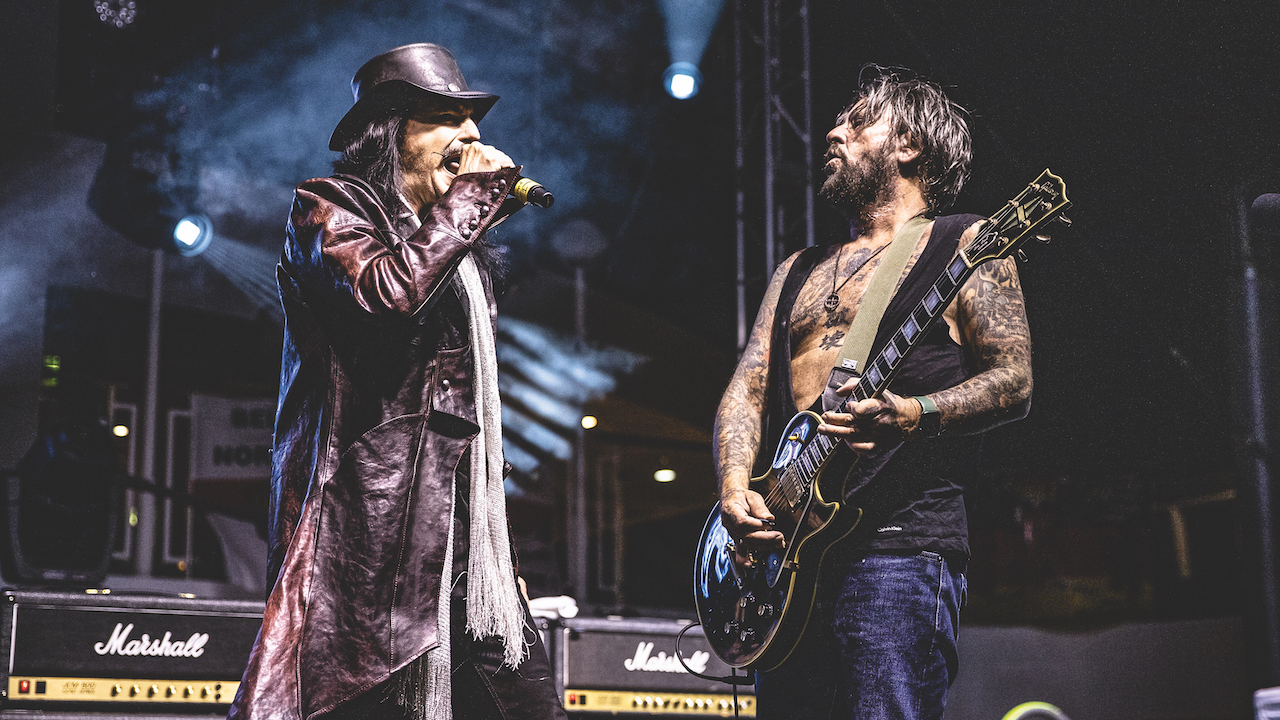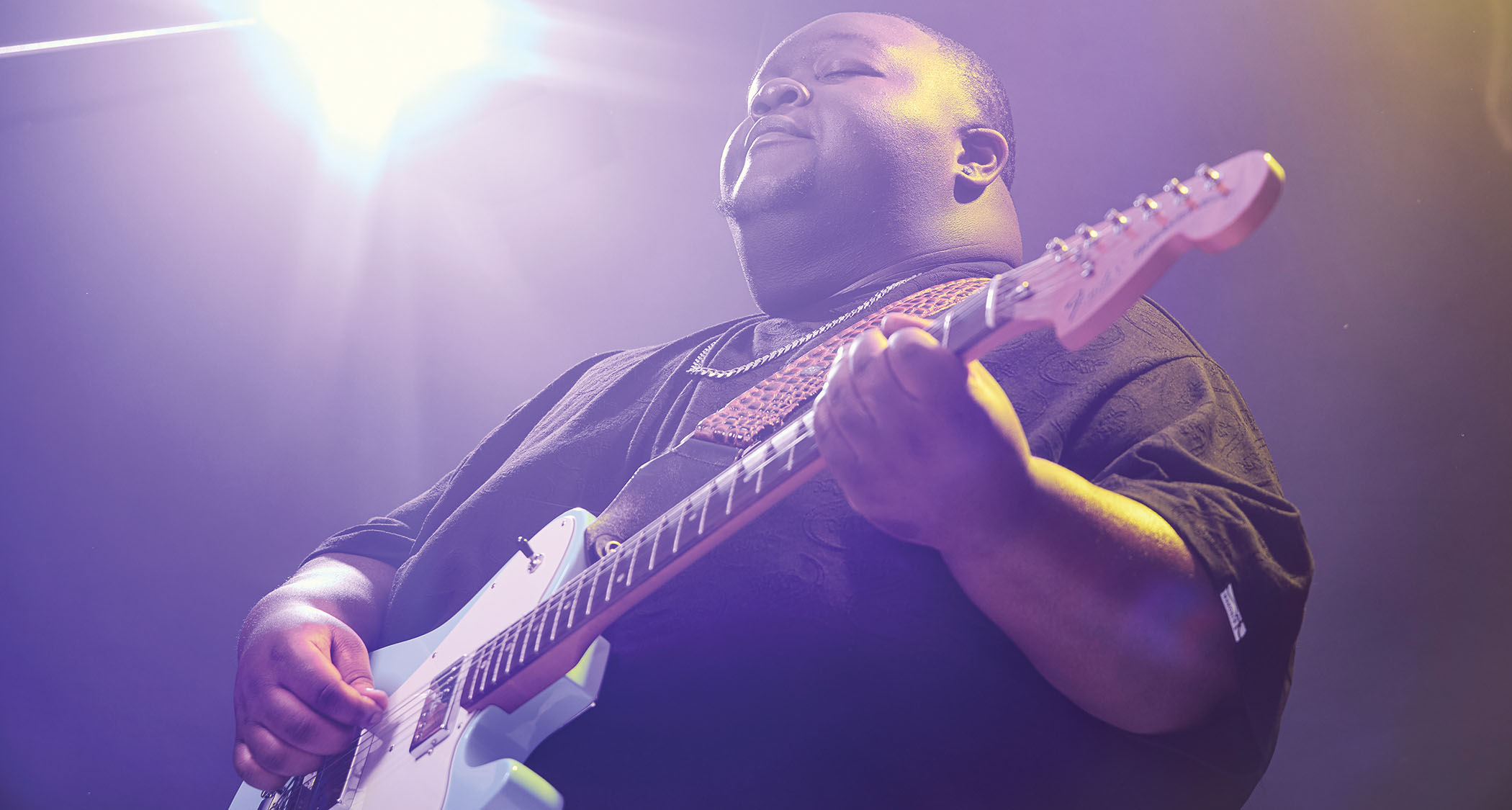“I look for musicians who play live and aren’t just farming followers on Instagram. The lifestyle of sitting at an Ikea desk, shredding guitar, day after day… I don’t want any part of that”: Tracii Guns on his favorite modern players and going digital
The LA Guns veteran has added to his long list of collaborations as he teams up with hard rocker Jack Russell for new album Medusa

All the latest guitar news, interviews, lessons, reviews, deals and more, direct to your inbox!
You are now subscribed
Your newsletter sign-up was successful
Tracii Guns has long slung his Les Paul in bouts of rock ’n’ roll excess as a longtime hair-metal icon with his namesake band, LA Guns. But lately he’s been branching out through several side gigs, one of which features Jack Russell of Great White.
Tracii joins us to dig into the tones behind his latest collaborative record (and beyond), Medusa.
What tones did you have in mind when you started the Medusa project?
“That record was really weird because, number one, I didn’t initially write anything. And number two, they [Frontiers Records] leaked the songs over to me one at a time. So I never had an overall picture of what I thought that record would sound like; it was like hors d’oeuvres, like, ‘Here’s an appetizer, now go create the main course.’
“But the good thing was that HeadRush had just come out with the MX5 [guitar effects and amp modeller], and I was really excited about it. So with each song I made a new patch, as each song sounded, to me, different. For example, on the single that came out, Tell Me Why, you can tell it’s a Tele. But on other tracks, I used my Black Beauty Les Paul. It was a varied approach.”
Regardless of the record you’re on, your modern-yet-vintage sound always bleeds through. What shapes your tone?
“It’s a lot of stuff. But as I’m writing music, the HeadRush thing has become so important, you know? Especially during the pandemic – I’d write something and be like, ‘Oh, this needs to be a Joe Perry thing,’ or maybe I’d say, ‘Ah, this sounds more like Randy Rhoads or Dave Murray.’
All the latest guitar news, interviews, lessons, reviews, deals and more, direct to your inbox!
“The luxury of the HeadRush is that it locks in vintage stuff, like a Soldano or so many different sounds for a rhythm track, for example. For me, my ears tell me what I want to hear. They tell my brain, ‘This is what you need.’ From there, it’s about tweaking the EQ, gain, and finding what feels nice to me.
“There’s a song on this album called Medusa, and I shaped my tone by picturing an old vintage amp with a lot of distortion – like an old Fender Bassman, with maybe a Tube Screamer, and kept nudging it from there.
“And then, for the rhythm track, I’ll look for something like an old Marshall Plexi, add a little distortion, and play with it until it feels right but still has the listener thinking, ‘Yeah, that sounds like what Tracii does.’”
Your solos are always very lyrical and seldom redundant. You seem like the type of player who would feel restricted sticking to typical eight-bar solos all the time.
“When stuff starts to get redundant, I usually start picking up the notes through the chords of the solo. So if there’s eight bars, and there’s a definite chord progression, and it starts sounding real jammy instead of lyrical, I’ll play the notes of the chords and add until it begins to sound like its own little song. Then I can add licks to those chord changes, and suddenly, it sounds like a guitar solo.”
Many people see solos as throwaway – how do you view the function of solos in your songs?
“Oh, it has to stand on its own. It can’t just be a matter of, ‘There’s this space I’ve got to fill up with noise,’ you know? Some things might call for that, but I’ve never approached it like that. I always try to get into that space and write something new, something clever. If I’m going to make noise, it’ll have a purpose. I don’t like standing there for an extra five minutes and having it be lazy.”
Most people consider you a ‘Les Paul into a Marshall’ guy, and that’s true to a degree. What have you been using lately?
“I’ve been using the Park Little Head 18 lately, which is basically a 20-watt Marshall. I have another Park Little one that’s like a Bluesbreaker combo but also like a JTM100 with lots of vintage distortion. While working on this record, and now that I’m working on the next LA Guns record, I’ve been messing around with that a lot. I got kinda stuck on that combo amp, and I’ve been going from my Tele and, of course, using different Les Pauls.”

You love your Boss pedals, but what other pieces of kit are on your ’board these days?
“I’m using the HeadRush [MX5] a lot when I play live; I have a lot of cool shit programmed in there. I’ve got a gigantic stereo delay, a small stereo delay and a Tube Screamer, which I never really turn on because there’s too much crazy feedback. I’ve always got a fuzz, which sounds a lot like the Boss. But I have a cool tape delay, and there’s a chance I’ll have an all-analogue setup when I get back on the road in August.
The lifestyle of someone sitting at an Ikea computer desk, shredding guitar, day after day – I don’t want any part of that lifestyle
“But when I’m at home, I still love my Boss pedals. In the end, other stuff’s cool, but I have difficulty tweaking things that sound a way I’m not used to. My range does not want to hear things it’s not used to, so I use the Boss, especially the silver fuzz [FZ-5]. It’s so in-your-face, not too bright, and I can really dial it in. I especially love the Waza Craft one [FZ-1W], but not the one that’s like a Tone Bender.”
Frontiers is having you work on a ton of collaborative projects of late. What’s the secret sauce that keeps the Tracii Guns recorded tone in demand?
“I mean, I’d say it’s because I’m a chameleon when it comes to doing these things. I guess my personality comes through no matter what style or who I’m working with. Plus, it makes them some bucks [laughs]. But, for me, it’s really an outlet. The one thing that used to drive the guys in LA Guns crazy is that I’d be doing all these side projects and make all these bands, and it would interfere.
“So doing projects like this thing with Jack [Russell], or the thing with Todd Kerns, it’s a much better outlet than making a whole new fucking band! I’m never gonna tour with any of these other guys; none of that is ever gonna happen. It’s a safe zone. I get to be creative, people like it, and it sells a lot of gear [laughs]. It’s like this interview now – people wonder what I used on a song, and maybe they’ll want it themselves. Like, ‘Oh, what pedal was that?’”
You’re much more of a guitar nerd than people realise, aren’t you?
“Oh, yeah. I get to be a little part of the guitar-nerd community, which is cool because I’m not really known for being a guitar nerd. But obviously, I am one. And on a selfish level, it’s great for me. I’m like the guitar nerd who is old [laughs]. People come to me and say, ‘Hey, man, what’s this or that?’ because I’ve used it all like 20 years ago.”
You’re pretty tuned into the sights and sounds of the guitar community. Is it in a healthy place?
“As far as what’s happening online, I gotta say, there’s people like Grace Bowers and Sam Bam Koltun who have swagger and are blowing minds. That’s what I look for. I look for players with personality and who really understand the emotion of playing heavy rock guitar as opposed to just, ‘Oh, look how fucking fast I can play.’ I look for musicians who play live a lot and aren’t just farming followers on Instagram.
Sitting in your safe zone, going over scales and modes repeatedly to get attention, man, what does it lead to? Where does it get you?
“As time has gone on, it’s become more about getting likes and recognition on social media – and what’s getting lost in translation is the personality of the songwriting and performing in front of people. That’s what makes you special. Art is about the identity of the creator. I relate to the ones who go out and tour; I love the lifestyle, you know?”
There’s certainly a romance to that as far as guitar goes!
“The lifestyle of someone sitting at an Ikea computer desk, shredding guitar, day after day, like, I don’t want any part of that lifestyle. I want to be part of a lifestyle where it’s like, ‘Hey, I didn’t sleep, and I missed these three notes because I couldn’t get in the shower at the truck stop, and some toothless woman was trying to pickpocket me.’ That creates character.
“Sitting in your safe zone, going over scales and modes repeatedly to get attention, man, what does it lead to? Where does it get you? It’d rather look at a player and say, ‘They’re a bad motherfucker, they’re gonna be around forever.’ That’s how I feel about players like Grace and Sam; they have personality, vibe, swagger, tone and dexterity. They do their thing.”
- Medusa by Russell/Guns is out now on Frontiers Music SRL.
Andrew Daly is an iced-coffee-addicted, oddball Telecaster-playing, alfredo pasta-loving journalist from Long Island, NY, who, in addition to being a contributing writer for Guitar World, scribes for Bass Player, Guitar Player, Guitarist, and MusicRadar. Andrew has interviewed favorites like Ace Frehley, Johnny Marr, Vito Bratta, Bruce Kulick, Joe Perry, Brad Whitford, Tom Morello, Rich Robinson, and Paul Stanley, while his all-time favorite (rhythm player), Keith Richards, continues to elude him.



